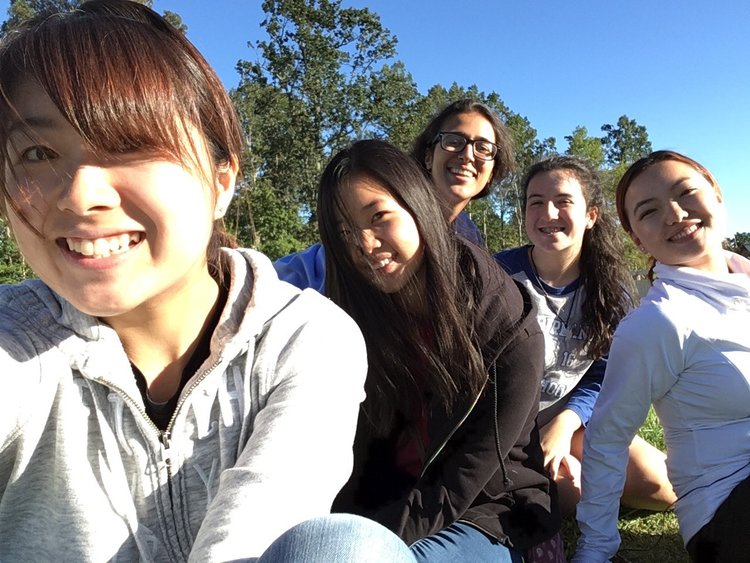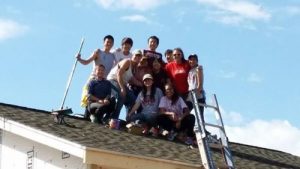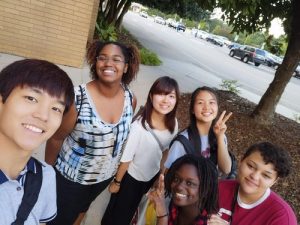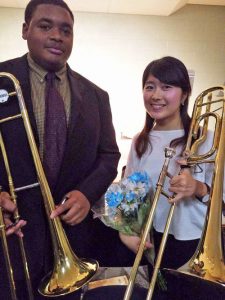Interview with Study Abroad Scholar Miyu Higashimura
We interviewed one of the recipients, Miyu Higashimura, who is currently studying at Guilford College in Greensboro, North Carolina.

JICUF: Hi Miyu. Please tell us a little bit about yourself.
MH: I am from Nishinomiya City, Hyogo Prefecture. I moved to Tokyo when I entered ICU. I lived on the third floor of Ginkgo House for two and a half years until I came to the United States. I lived in the Kansai region throughout my childhood, and this is the first time for me to live abroad.
I am majoring in Gender and Sexuality Studies (GSS) at ICU. I have not decided on my minor yet, but I’d like to choose either sociology or anthropology.
I love music in general. I started taking piano lessons when I was young, and played the trombone in a band in high school. At ICU, I joined a gospel choir and was the alto leader for a year when I was a sophomore. I traveled to New York during the last winter break and visited Harlem, the center of African-American culture, and listened to gospel.
JICUF: It’s been five months since you started your studies at Guilford College. Has life at Guilford been what you’d expected? Has anything surprised you?
MH: It was my dream to study abroad, and I still can’t believe that I am actually here. I am still taking in the fact that I am in an environment where I can pursue GSS from a diverse viewpoint in terms of race, ethnicity, class and religion. In this sense, my goals for coming to the United States have already been fulfilled, and everything is as I’d expected.
Perhaps this explains why I have not felt homesick at all for the past five months. Since this is my first time living abroad, I was anxious before I left that I might feel homesick or want to go back to Japan. However, since I arrived here, the feeling of not wanting to go back to Japan is stronger! It’s all thanks to the many friends I made at Guilford. I’m grateful.

One thing that surprised me was that Guilford College offers many community service opportunities and these activities are deeply rooted in the local community. For example, the college invites immigrant children from local neighborhoods and students play with them. It also offers temporary accommodation to immigrant families until they find permanent homes. I have participated in several social service activities, and they were invaluable experiences. Through these experiences, I gained exposure to current issues in American society. During the fall break, I participated in the Quaker Work Trip in which we helped build new homes for people who lost homes to tornadoes. I was struck by the way the college not only offers learning opportunities for students but actively tries to resolve issues that the local community faces. It was also eye-opening that many students participated in these service activities. As an exchange student, I am very proud that Guilford is actively supporting the local community.
JICUF: What have you gained from your study abroad experience so far?
MH: There are many things, but perhaps the most important thing is the ability to view things from diverse viewpoints. This has prompted me to think about my own existence and identity and become more sensitive to the way I communicate with people.
When I was in Japan, I made a lot of assumptions but was unaware of it. Since I arrived here, however, I’ve met people whom I otherwise would not have had the chance to meet and experienced being a minority as a non-native English speaker from Japan. This enabled me to realize how dangerous it is to hold assumptions as it could create marginalized groups. I began to choose words with care in both English and Japanese, and became more cautious when conversing with people. Perhaps communication should be a delicate process in this way. This is something I could not have learned in Japan.

Another thing I gained from studying abroad is that I now have a greater interest in the United States. This is an intriguing country which can’t be explained in a few sentences. It is often described as a “melting pot” (I learned after my arrival in the U.S. that this very expression can be problematic), and I felt that it is truly a diverse environment where multiple ethnicities, religions and cultures coexist. It’s amazing that such a diverse nation can function. I can’t think of another society that is more diverse. At the same time, I realized that Japan is also actually diverse. I was sometimes surprised by the impression people here had of Japan or the Japanese people, and I also became aware of my own stereotypes or misconceptions of Japan. In this sense, I can say that my view of Japan ha
s changed as well. These are the things I’ve gained from my experience abroad, and they will continue to influence me in the future.
JICUF: What courses are you taking now? Have you joined any student clubs?
MH: Last term, I took three courses mainly in Gender and Sexuality Studies. Among them, the course that left the strongest impression on me was “Philosophy and Sexuality.” It was a discussion-based class that sought to approach various issues in sexuality from a philosophical perspective. Through this course, we took a philosophical approach to issues such as sex education, sex workers, BDSM and feticism. It was a valuable experience through which I was able to learn about issues that were not discussed at ICU.

In addition to these classroom lectures, I took a one-credit course in jazz ensemble in the music department. I had the chance to play the trombone again! Since it was an ensemble, there weren’t many participants, but Guilford alumni and staff participated as well as students, and it was a friendly and fun class. We had two concerts, one during mid-term and the other at the end of term, and not only my friends but the professor who taught the “Philosophy and Sexuality” class came. I was so happy. This sense of community is definitely one of Guilford’s strengths.
This term, I am taking courses in religion, sociology and gender & sexuality. The new term has just begun, but every class is interesting and I am very excited!
As for club activities, I joined two societies. One is called Guilford College Pride, which is an LGBTQ+ community. We meet once a week and discuss issues related to gender and sexuality. The group also works with the university’s Multicultural Education Department to promote sexual diversity on campus and organizes workshops on a regular basis.
The other club I joined is the International Club. The club is comprised not only of students from overseas but American students as well, and we learn about other cultures. Each term, we plan several events, and we are now preparing for an international festival to be held this term.
JICUF: What would you like to do in the future? What are you plans after graduation?
MH: I hope to engage in activities making use of what I learned through my research in GSS. Since I came to the U.S., I feel more strongly that sexual diversity is not promoted enough in Japan. Recently, some corporations and educational institutions claim to be “LGBT friendly”, but often their policies are inadequate. The content of sex education in Japan is also insufficient, and understanding of sexual diversity is far from widespread in Japan. I would like to be involved in a grass-roots activity to rectify this. To do this, I will need more knowledge and expertise, and for this reason I decided to continue my studies in graduate school. I hope to study at a graduate school overseas. My aim is to engage in a more extensive research on the topic of my senior thesis.
JICUF: Thank you, Miyu. We hope you enjoy the rest of your time at Guilford!



